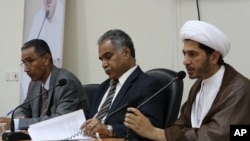Opposition parties in Bahrain have vowed to carry on with public demonstrations for political reform, after security forces prevented activists from staging a mass rally to mark the first anniversary of their uprising.
A number of clashes between police and opposition supporters were reported throughout Tuesday’s anniversary and into Wednesday.
Rights groups say Bahraini forces used tear gas and birdshot pellets on demonstrators, which left about 100 people injured.
Many activists had attempted to march back to the original site of their protest movement, the former Pearl Roundabout, but were stopped with force.
Six Americans from an advocacy group called Witness Bahrain were detained near the site, which is now a restricted military zone. They were later deported for entering the country under “false pretences.”
Despite the government having the clear upper hand in the conflict, Sheikh Ali al-Salman, leader of the main opposition party al-Wefaq, says his supporters will carry on demanding change in the streets.
“The people will continue to raise their demands until [they] achieve a democratic system in Bahrain,” he said.
The majority of Bahrain’s opposition are Shi’ite Muslims, who make up roughly 70 percent of the country’s indigenous population. They say they are treated like second-class citizens and not given the same rights as the Sunni minority which rules the kingdom. They are calling for Bahrain to become a constitutional monarchy.
Opposition parties continue to criticize the government for allowing security officials to use, what they call, excessive force against civilians. Last year, the parties pulled out of a national dialogue, saying they had received unequal representation in it.
According to Jumal Fakhro, first vice chairman of Bahrain’s Shura Council legislative body, reconciliation relies on opposition participation in the discussions.
“They cannot put the blame on the government and be outside the game, they should come and participate,” said Fakhro.
Fakhro says the opposition’s actions show they are not interested in compromise.
“I think they believe that the only way that they can win the battle is by being aggressive on the street,” he said.
Not so, according to Radhi Mohsen al-Mosawi, deputy secretary-general for political affairs of the Wa’ad party. He says the opposition also believes dialogue is the only way to solve Bahrain’s problems. But he says the government must give fair representation to all parties and clarify its intentions for holding talks.
“They have to declare what they want from this dialogue. They didn’t tell us anything,” said al-Mosawi.
As political stalemate in Bahrain continues, violence in the country grows. An increasing number of protesters are hurling firebombs and stones at police during weekly altercations. The protesters say it is partly in retaliation for what they say is the indiscriminate use of tear gas in residential areas.
Rights groups say more than 60 people have been killed in clashes between security forces and protesters since civil unrest began a year ago.
| Join the conversation on our social journalism site - Middle East Voices. Follow our Middle East reports on Twitter and discuss them on our Facebook page. |












